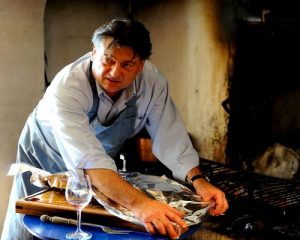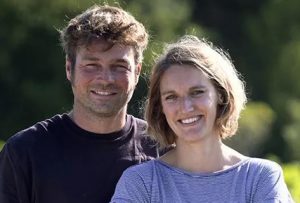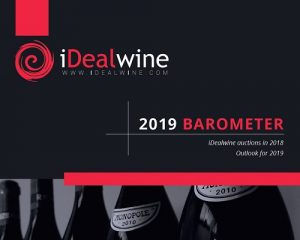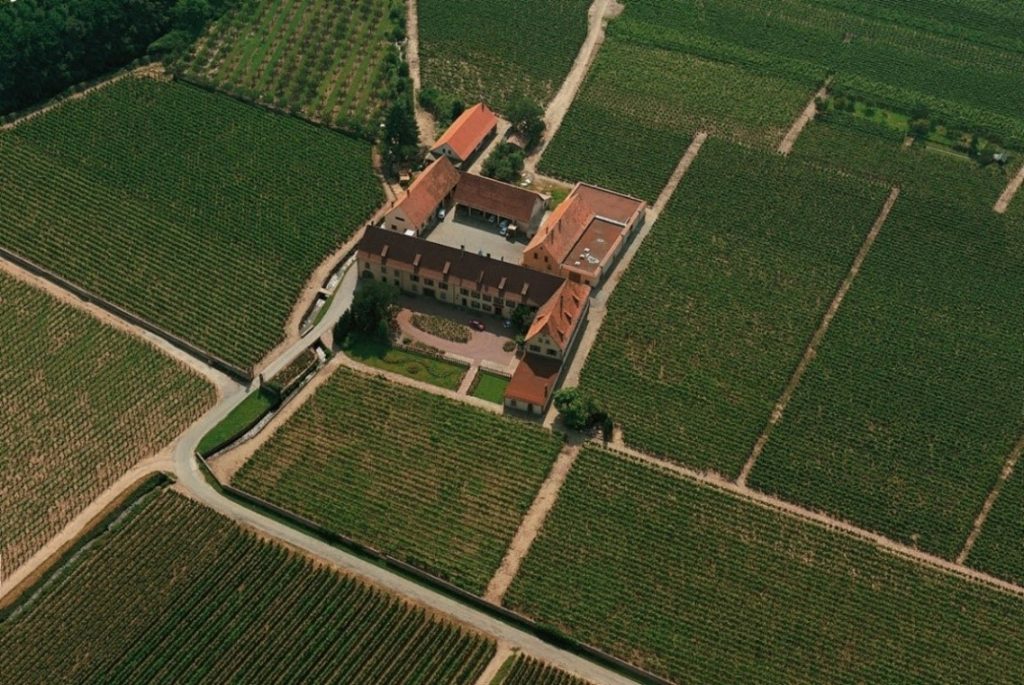
There are those vineyard visits that you’ll never forget. Domain Weinbach is one such visit. This summer, Constance did a little road trip around Alsace, visiting some of the finest domains in the region. She tells us about this iconic producer.
In August 2018, domain Weinbach opened its doors to Constance, where she was welcomed by Eddy Faller and taken to visit the vineyards. While crossing the courtyard, they caught a glimpse of the vinification area. Eddy’s brother Théo has long-since been in charge of vinifications, staying true to Alsatian tradition and giving utmost respect to the purity of the grapes. He intervenes as little as possible during every step of vinification. The grapes ferment slowly in old oak barrels with ambient yeasts. These containers are perfect in avoiding overly-pronounced aromas of wood, while allowing for a micro-oxygenation which is ideal for the development of other complex aromas.
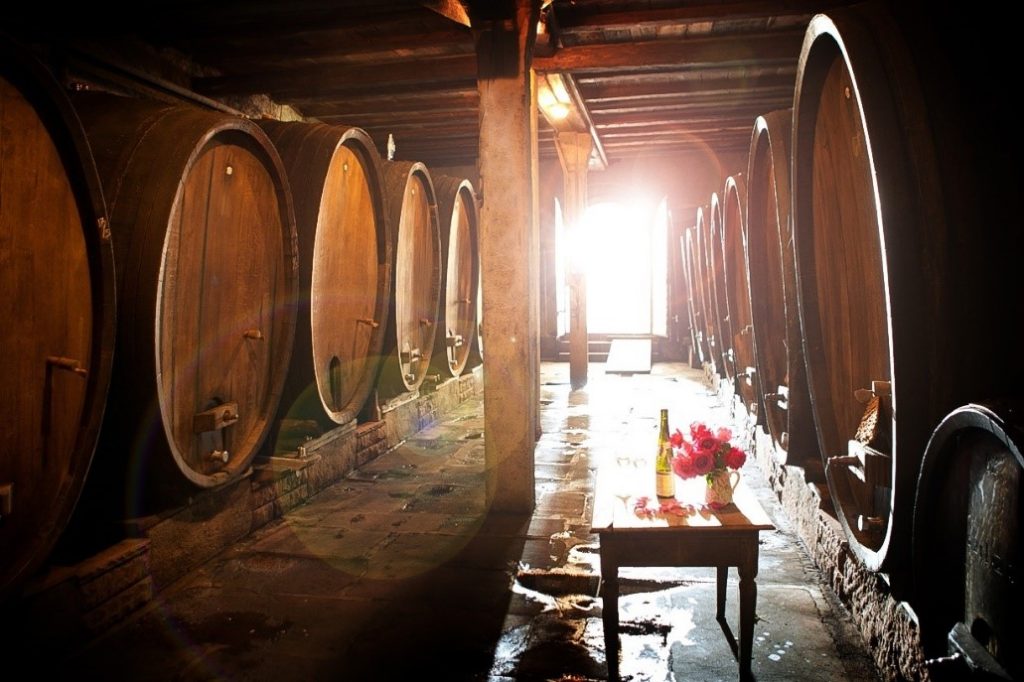
Schlossberg is an iconic Grand Cru, over which vines grow at between 230 and 400m of altitude on 80 hectares of terrasses. The origins of the “Clos” date back to the 17th century and the parcel from which the “stream of wine” name comes used to belong to Capucin monks before being sold as a national asset during the French Revolution, and then bought by the Faller brothers in 1898. They then passed it down to their sons and nephew Théo who have done tremendous work in promoting the wines, terroirs and regional grape varieties. In 1979, his wife Colette took over the reins, followed by her daughters Catherine and Laurence who are equally motivated by this quest for excellence. Catherine Faller now runs the domain with her two sons Eddy and Théo.
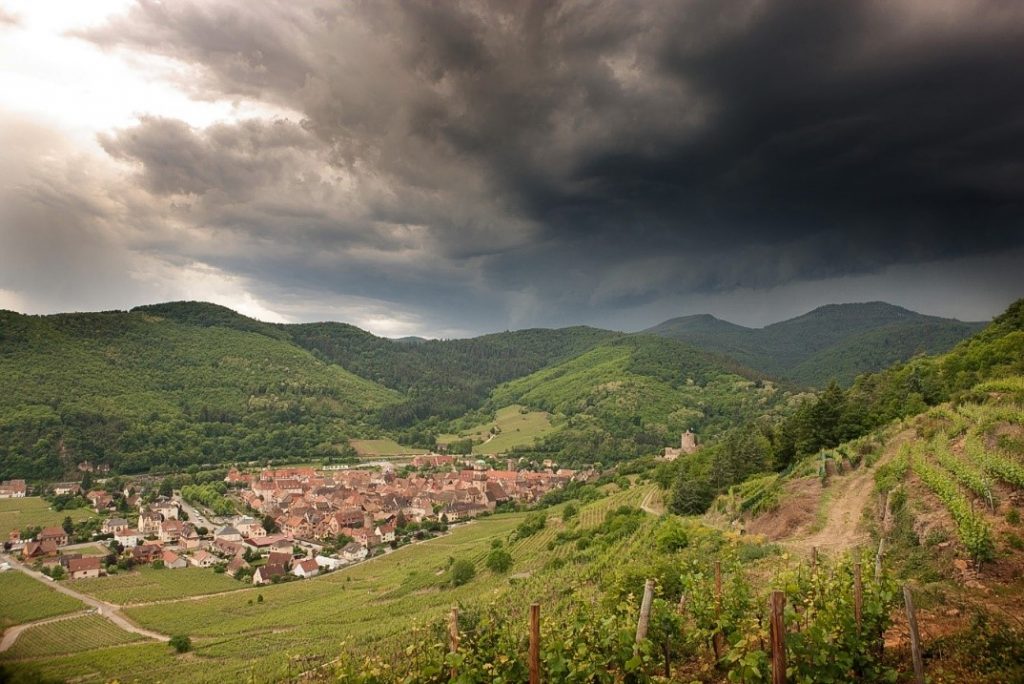
Back at the domain, it’s time for the tasting. Eddy Faller presents the wines, whose purity, balance, suppleness and vibrancy are simply outstanding. Old vintages show their ability to age without losing any of their energy, all the while gaining in complexity.
The wines from domain Weinbach currently for sale
The Cuvée Théo Riesling comes from the Clos des Capucins vineyard; the fruit is first fermented in old oak vats using indigenous yeasts before maturation in barrels. The resulting gem of a cuvée has a clear, golden straw colour, with subtle aromas of white flowers and citrus greeting the nose. On the palate it is bold and balanced with lots of citrus freshness and a fine persistant finish. Pair with delicate seafood dishes and drink within its first 8 years.
Pinot Gris Quintesence de Grains Nobles Cuvée d’Or 2006
The Cuvée d’Or d’Altenbourg Quintessence de Sélection de Grains Nobles is a rare cuvée indeed, produced in tiny quantities only in exceptional years. Coming from grapes shrivelled by the noble rot fungus, the resulting wine offers aromas of candied fruit and honey. At once rich and fresh, it delights with its fine long finish. Such a characterful wine can be enjoyed on its own, but also makes a fine accompaniment to spiced or slightly acidic dishes.
Riesling Vendanges Tardives Schlossberg 2000
This expressive cuvée reveals notes of lime tree flowers and yellow fruits on the nose, whilst the mouth is dense yet balanced, with a fresh long finish. Coming from the magnificent Schlossberg terroir, renowned for formidable winegrowing since the 15th Century, this bottle has all the delicacy and elegance that its reputation promises. Racy, nervous with a long palate, this prestigious wine comes into its own paired alongside salmon tartar or a roast chicken stuffed with goats’ cheese and dried apricots. Can cellar for a good 10 years.
Riesling Grand Cru Schlossberg 2000
This Grand Cru Schlossberg Riesling has a beautiful golden colour, exuding notes of white-fleshed fruits and white flowers on the nose whilst the palate is strikingly mineral, offering a fresh long finish. This cuvée pairs beautifully with seafood dishes. On this domaine the Riesling is grown on granite bedrock with shallow, sandy soil. Its south-facing aspect enables the perfect sun-exposure for grape ripening and sugar accretion. Vines are cultivated according to organic and biodynamic methods and the fruit is fermented in old oak casks using indigenous yeasts, before maturation in barrels.
What the reviews say about domain Weinbach:
La Revue du Vin de France, 3* sur 3
Founded in 1612 by Capucin monks, domain Weinbach, literally “stream of wine” in German, owes its current prestige to the Faller family. While Théodore and Jean-Baptiste Faller, the famous Faller brothers, bought the property in 1898, it’s Théo, son of Théodore, who worked tirelessly for the recognition of the domain and the winegrowing region of Alsace. After the death of Théo Faller in 1979, his wife Colette, and daughters Catherine and Laurence, took over the running of the domain.
Guide Vert
“Clos des Capucins is one of those places which are magical, elusive and timeless. It is rare to find a place with so much energy and history, which produces wines of such great purity. […] This is one of the finest expressions of the Schlossberg Grand Cru, on different levels of maturity. Its clarity and precision. We are bowled over by its clarity and precision.”
bettane+desseauve (5 stars/5)
“Weinbach has built its success on the terroirs of the Kaysersbertg-Kientzheim region, producing Schlossberg Rieslings which are probably the purest interpretations possible of a wine from granitic soils.”

